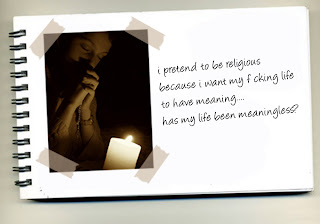Wednesday, February 29, 2012
menafsir waktu
Tuesday, February 28, 2012
Halte
Thursday, February 16, 2012
feist @fairground - jakarta
Is this the way to live? Is it wrong to want more?)
Wednesday, February 15, 2012
koffie fabriek Aroma Bandoeng
Thursday, September 16, 2010
Mendung
Tuesday, November 3, 2009
Doa Panjang
Sunday, February 15, 2009
Sunday, November 9, 2008
Malam (2)
Wednesday, September 17, 2008
Monday, June 30, 2008
Reflection Over The Weekend
Does Words Really Can Hurt or Heal?
The problem was and is that words do hurt. It doesn’t matter what age you are, we all have weaknesses and when someone tries to use that while taunting and teasing, it does hurt. And words that hurt can be sneaky, they don’t just hurt at that moment, but they can stick around in a person’s subconscious and hurt later too.
Mean words hurt us as adults, but we have the experience and knowledge to push them aside and let them go. Children, on the other hand, do not. That is the true purpose of this article, to bring attention to the fact that as adults we need to be more vigilant in what we say to young children. And I do not mean that we, as adults, need to coddle our children. Just take care.
At a very young age, when a child hears “you are a bad boy” they learn that they are bad, or worthless – not worthy of love or praise. This is the beginning of low self-esteem. It encourages the belief that they are bad and cannot do anything good. Telling a child that what they did was bad is a better way to phrase “you are a bad boy”. They need to learn that the action was bad and it is possible to correct the action.
Some words teach children to fear adults rather than respect them. Children do need to learn that there are consequences to their actions. But not by hearing things like, “if you don’t stop, I am going to knock you in the head.” That encourages the belief that violence solves problems. It also makes fear of an adult, instead of love or respect of an adult, the learning tool that encourages their behavior.
The way we speak to children is the first lesson in how they should speak to others. This is another reason to watch what you say to children and others around children. Instead of teaching them phrases they shouldn’t say, teach them what they should say. We do this by example – by not saying things that we wouldn’t want our children saying. When they learn inappropriate language, they then need to unlearn the inappropriate language. Children have enough to struggle with growing up, let’s not throw more obstacles in their path by teaching them hurtful words.



















